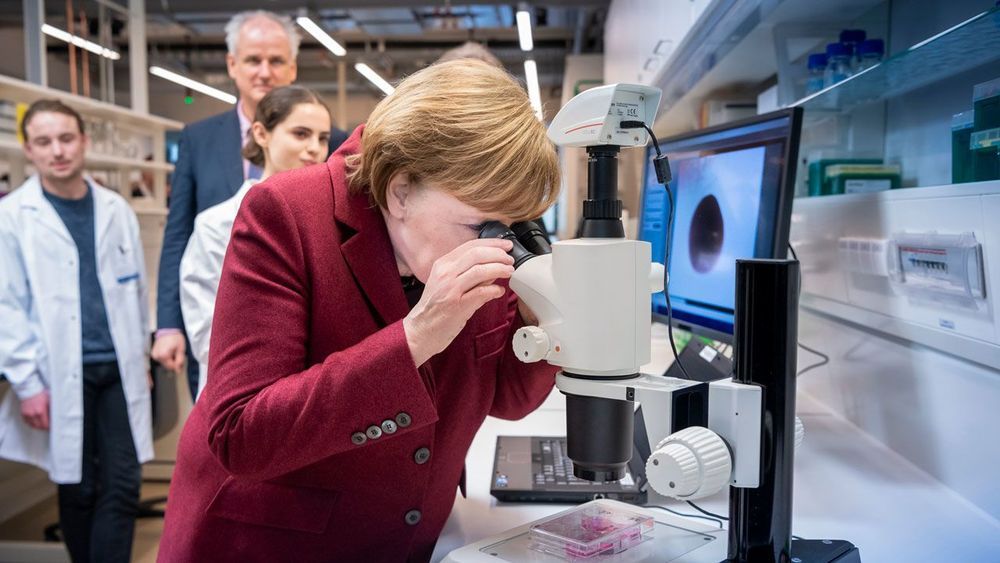Page 7874
Right now Chandra is gazing at a galaxy cluster in Draco. Nearby is the famous Tadpole Galaxy, seen here with thousands of galaxies in the background! The Tadpole’s tail of stars is over 280,000 light years long, stretched by gravity during a previous close encounter with another galaxy!
May 15, 2019
Deep learning could reveal why the world works the way it does
Posted by Michael Lance in category: robotics/AI
Very nice article at MIT Tech Review explaining Leon Bottou’s invited talk at ICLR on causality through invariance.
At a major AI research conference, one researcher laid out how existing AI techniques might be used to analyze causal relationships in data.
May 15, 2019
Chemical mixtures pose ‘underestimated’ risk to human health say scientists
Posted by Xavier Rosseel in categories: food, health
This year, the European Union heavily restricted four types of phthalates in consumer products because of their possible health effects. Phthalates are plasticisers, ubiquitous chemicals that soften plastics in many consumer products. They are present in food wrappings, clothes, packaging, car parts, cosmetics and fragrances.
Over time, these plasticisers end up in the air, soil, water, food and household dust. They can also end up in our bodies. This is worrying because they are implicated in reproductive abnormalities in mammals. Studies of people have linked plasticisers to sperm damage, lower fertility, early puberty in girls and thyroid effects. The phthalates will be now legally be restricted to 0.1% in weight in articles used by consumers or in outdoor areas.
But scientists are increasingly concerned not just about single chemicals, which are found in people’s bodies at levels that are usually not toxic, but about what happens to toxicity when these chemicals mix.
Continue reading “Chemical mixtures pose ‘underestimated’ risk to human health say scientists” »
May 15, 2019
A Conversation with Jackie Ying
Posted by James Christian Smith in categories: biotech/medical, nanotechnology
Center Stage in the current issue of ACS Central Science: A Conversation with Prof. Jackie Ying, founding director of the A*STAR Institute NanoBio lab in Singapore. Using #nanomaterials to develop inexpensive medical technologies:
May 15, 2019
Understanding the power of honey through its proteins
Posted by James Christian Smith in categories: chemistry, food
Honey is a culinary staple that can be found in kitchens around the world. Its long shelf life and medicinal properties make it a unique, multipurpose natural product. Although it seems that a lot is known about the sweet substance, surprisingly little is known about its proteins. Check out research in the Journal of Natural Products with new data on honey proteins that could lead to new medicinal applications:
American chemical society: chemistry for life.
May 15, 2019
Journal of Chemical & Engineering Data (ACS Publications)
Posted by James Christian Smith in category: engineering
Introducing JCED’s Latin America Special Issue. It comprises more than 30 articles from authors located in Argentina, Brazil, Chile, Colombia, Mexico, and Puerto Rico, and recognizes the vibrant and growing community of high quality thermodynamics researchers in the region. Read this Special Issue Today!
May 15, 2019
Europe abandons plans for ‘flagship’ billion-euro research projects
Posted by Derick Lee in categories: biotech/medical, robotics/AI
The consortium, called LifeTime, aims to use three emerging technologies—machine learning, the study of single cells, and lab-grown organlike tissues called organoids—to map how human cells change over time and develop diseases. It is one of six candidates in the latest round of ambitious proposals for European flagships, billion-euro research projects intended to run for 10 years. There is just one snag: The European Commission has decided that it won’t launch any of them.
Six candidate research proposals lost in limbo.
May 15, 2019
Boosting Levels of NAD+ May Make Senescent Cells More Aggressively Inflammatory
Posted by Lilia Lens-Pechakova in categories: biotech/medical, life extension
On senescent cells, mechanism of interaction and (potential?!) side effects of NAD+ supplements. “… Those people self-experimenting with NAD+ precursor supplementation should consider keeping a close eye on markers of inflammation…”
Enhancing levels of NAD+ in mitochondria via delivery of various precursor compounds as supplements is growing in popularity as an approach to boost faltering mitochondrial function and thus modestly slow the progression of aging. A human trial demonstrated improved vascular function as a result of nicotinamide riboside supplementation, for example. Researchers here show that increased NAD+ will likely make worse the inflammatory signaling of senescent cells, however. Senescent cells accumulate with age, and are an important cause of the chronic inflammation of aging that drives the progression of many age-related diseases.
The results here suggest that efficient senolytic treatments to selectively destroy senescent cells should proceed any of the current approaches to raising levels of NAD+ in older individuals — and it is an open question as to whether any of the existing available options are efficient enough to make NAD+ enhancement safe in the longer term. Those people self-experimenting with NAD+ precursor supplementation should consider keeping a close eye on markers of inflammation.
May 15, 2019
Now hiring for project ‘Rejuvenation Now’ …
Posted by Michael Greve in category: life extension
If you are an MD or scientist interested in bringing evidence-based rejuvenation therapies to a broader audience, this is for you!
Help to accelerate the access to Rejuvenation Therapies.
















